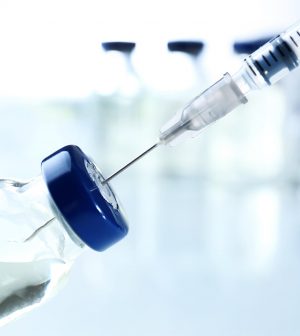- Could Your Grocery Store Meat Be Causing Recurring UTIs?
- Are You Making This Expensive Thermostat Error This Winter?
- Recognizing the Signs of Hypothyroidism
- 10 Strategies to Overcome Insomnia
- Could Artificial Sweeteners Be Aging the Brain Faster?
- Techniques for Soothing Your Nervous System
- Does the Water in Your House Smell Funny? Here’s Why
- Can a Daily Dose of Apple Cider Vinegar Actually Aid Weight Loss?
- 6 Health Beverages That Can Actually Spike Your Blood Sugar
- Treatment Options for Social Anxiety Disorder
Mpox Vaccine Protection Quickly Fades; Boosters Necessary: Study

Vaccine protection against mpox fades quickly in the human immune system, even in people who’ve received the full two-dose regimen, a new real-world study shows.
Antibody levels fell to low or near zero within the first few months of getting the vaccine, unless the person had previously received a smallpox vaccine, scientists reported Saturday at the European Congress of Clinical Microbiology and Infectious Diseases in Barcelona.
In the study, less than half of men without prior smallpox vaccination had any detectible antibodies to mpox (formerly known as monkeypox) 28 days after getting their second jab, the findings showed.
“The results presented here indicate that long-term protective immunity might need a booster dose for its maintenance,” said researcher Dr. Klara Sonden, deputy state epidemiologist for the Public Health Agency of Sweden.
The researchers noted that no clinical trials are underway to investigate a booster dose for the mpox vaccine, and that such trials are needed to inform public health guidelines.
Mpox cases have surged in the latter half of 2023 in European countries, following a sharp decline in the months after the vaccine was approved there in late 2022, researchers said.
A case study also presented at the meeting illustrates the point of the new study: A 35-year-old man had a breakthrough mpox infection despite having received two doses of Jynneos vaccine.
In January 2024, two years after getting the vaccine, the man attended a Vienna event at which he had multiple sexual partners, researchers said.
Five days later, the patient reported fever, chills, headache, discomfort urinating, bloody diarrhea and itching of his penis and anus, researchers said.
Tests revealed that the man had an active and severe mpox infection. It took 25 days for his scabs to fall off and a swab test to show the infection had ended.
“This was Austria’s first monkeypox breakthrough case,” said Dr. Luigi Segagni-Lusignani, of the Public Health Authority in Vienna. “Despite no hospitalization, the clinical course was not less severe than in unvaccinated patients, with longer disease duration and higher scores on the monkeypox severity scale.”
For the antibody study, researchers followed up on 100 gay men who went to a sexual health clinic in Stockholm to receive the European mpox vaccine, Vaccinia Ankara–Bavarian Nordic.
Only men who’d been previously vaccinated against smallpox continued to carry potentially protective levels of mpox antibodies when retested at 28 days, researchers found.
Researchers believe that previous smallpox vaccination helped immune “memory” cells better adapt to the mpox virus, since the men already carried antibodies against smallpox.
“Monkeypox vaccination results in neutralizing antibodies only in a proportion of vaccinees, and a significant decline occurs already during the first month post-vaccination,” Sonden’s research team concluded.
The largest sexual health clinic in Sweden is planning to perform a randomized clinical trial of a booster dose, researchers said. However, there have been few mpox cases in Sweden.
Because the findings from the two studies were presented at a medical meeting, they should be considered preliminary until published in a peer-reviewed journal.
More information
The World Health Organization has more about mpox.
SOURCE: European Congress of Clinical Microbiology and Infectious Diseases, news release, March 30, 2024
Source: HealthDay
Copyright © 2026 HealthDay. All rights reserved.










